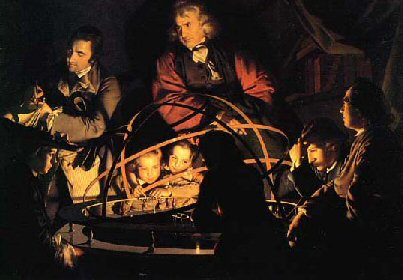
A Philosopher Giving That Lecture On The Orrery In Which A Lamp Is Put In Place Of The Sun by Joseph Wright, 1766. An orrery is called an orrery because one of the first ones was made for Charles Boyle (1676-1731), the Fourth Earl of Orrery.
Monday, February the 21st, 2005
back to: title, date or indexes
Hard to credit, but it was exactly fifty years ago today that Dobson, the out-of-print pamphleteer, made his one and only appearance on the radio. He was booked to appear on the then popular show Bad Gas And Forts, a sort of uncategorisable hour of talk, static and field recordings hosted by an anonymous spook known only as The Gravel-Voiced Ghoul.
Dobson's participation was the result of a long campaign by Marigold Chew, who spent months standing outside the producer's office building, holding a flag and haranguing passers-by to sign a petition. The producer had sworn an oath that Dobson would never appear on the show, apparently because of some otherwise forgotten incident involving a rowing boat and a flock of bitterns. Marigold Chew was eventually able to prove that the oath contravened the ancient law of civil and pursuivant debaling, and it was struck down by magisterium bossa nova in Chancery.
The show was broadcast live, and no recording was made. However, by pasting together the shreds of a hastily-scribbled transcription, it is possible to get some idea of what took place. The Ghoul's first guest was an elderly writer who had defected from the Soviet Union. In the immediate post-revolutionary period, he had written a series of heart-warming tales about a peasant family under the title Little Yürt On The Tundra. With the suppression of the kulaks, and under pressure from the Comintern, he rewrote these works as Little Foundry On The Collective Farm. If the transcript is reliable, the remarks he made were punctuated by loud hammering noises.
After about ten minutes, the Gravel-Voiced Ghoul introduced Dobson. Asked to continue the theme of cloying family-centred story-telling, the pamphleteer embarked on a lengthy anecdote about the books his ma read to him as a child. Here, as far as can be pieced together, is what he said:
“My ma was a huge fan of detective fiction, so my bedtime stories tended to be whatever she was reading at the time. One of her favourites was Dorothy Sleet, who wrote a series of whodunits featuring Rex Shroud, Orrery Sleuth. Shroud was a sleuth all of whose cases involved an orrery at some point in the story. What is that hammering noise? Sleet created one of the classic detectives, I think. He may not be quite on a par with M P Shiel's Prince Zaleski, but she put a lot of thought into giving the Orrery Sleuth all sorts of idiosyncrasies to make him a memorable and fully-rounded character, not just a solver of puzzles. He has a false lung, too many teeth, and is a daily practitioner of Baxterism. His lantern is ruby red. At moments of high desperation, he will invariably fiddle about with a little tin of talcum powder. He keeps blotting paper in his pocket and that hammering is really getting on my nerves. Perhaps the best story Dorothy Sleet ever wrote was The Orrery Sleuth And The Pod People From The Weird Parallel World Out Of Time And Space. You think you're reading science fiction, but that's just narrative pyrotechnics. It is, I think, both valiant and boisterous, as the best prose always tries to be. She was a woman of baleful countenance, Dorothy Sleet, and kept many tortoises in her seaside bungalow. She married four times, and each of her husbands vanished unaccountably. The first three simply vapourised in the kitchen while making omelettes, and the fourth was last seen in Ireland, in the vicinity of the Wobbling Virgin of Ballinspittle.”
At this point the hammering noises drowned out Dobson. By the time they stopped, the show had come to an end, and listeners were treated to a concert by Xavier Cugat and His Orchestra. Dobson never received a fee for his appearance. Some years later, he and the Gravel-Voiced Ghoul passed each other in the street. They did not acknowledge each other.

A Philosopher Giving That Lecture On The Orrery In Which A Lamp Is Put In Place Of The Sun by Joseph Wright, 1766. An orrery is called an orrery because one of the first ones was made for Charles Boyle (1676-1731), the Fourth Earl of Orrery.
Hooting Yard on the Air, February the 23rd, 2005 : “Total Eclipse” (starts around 11:19)
Hooting Yard on the Air, February the 1st, 2006 : “Some Notes on Compartments” (starts around 25:08)